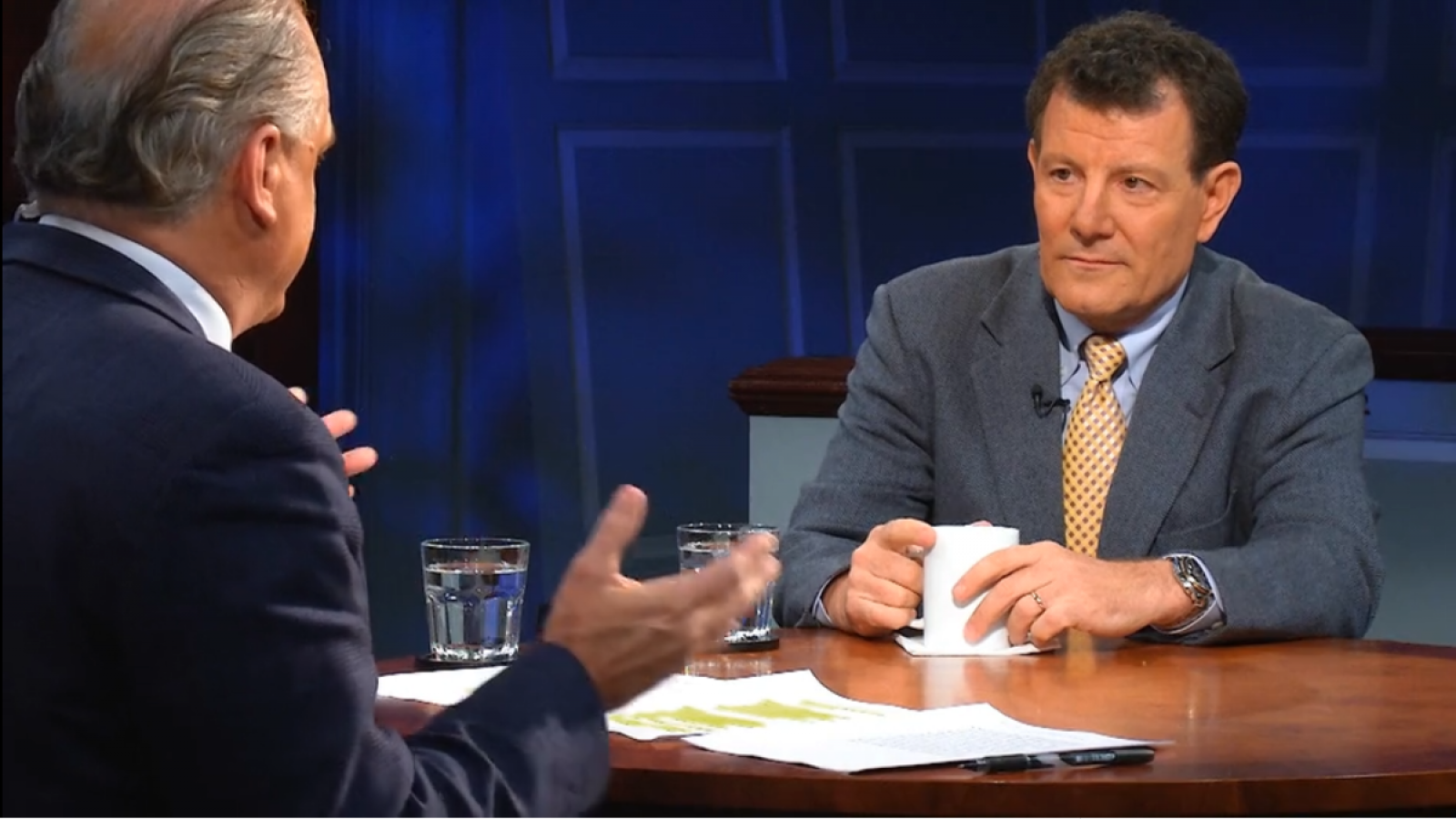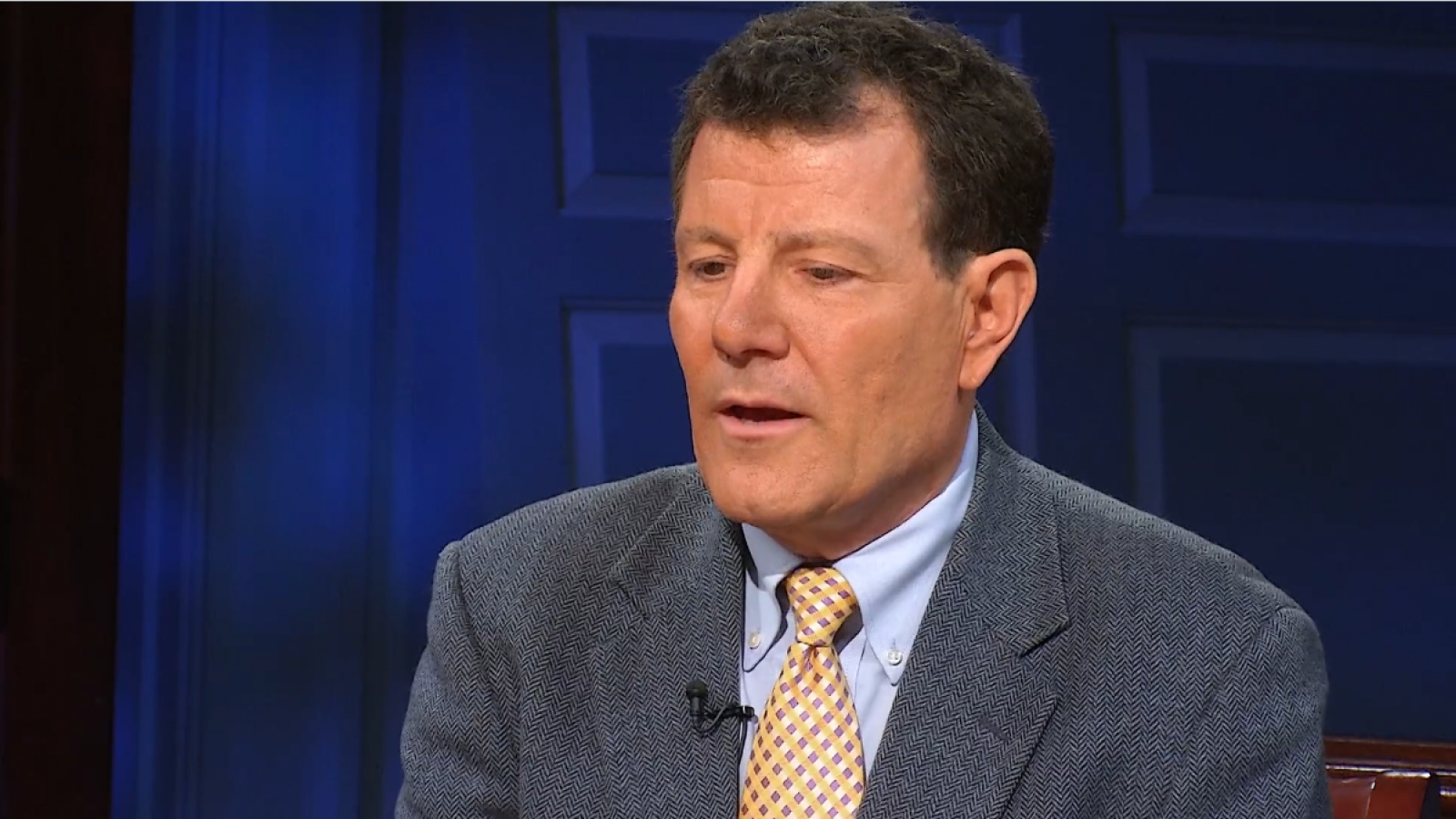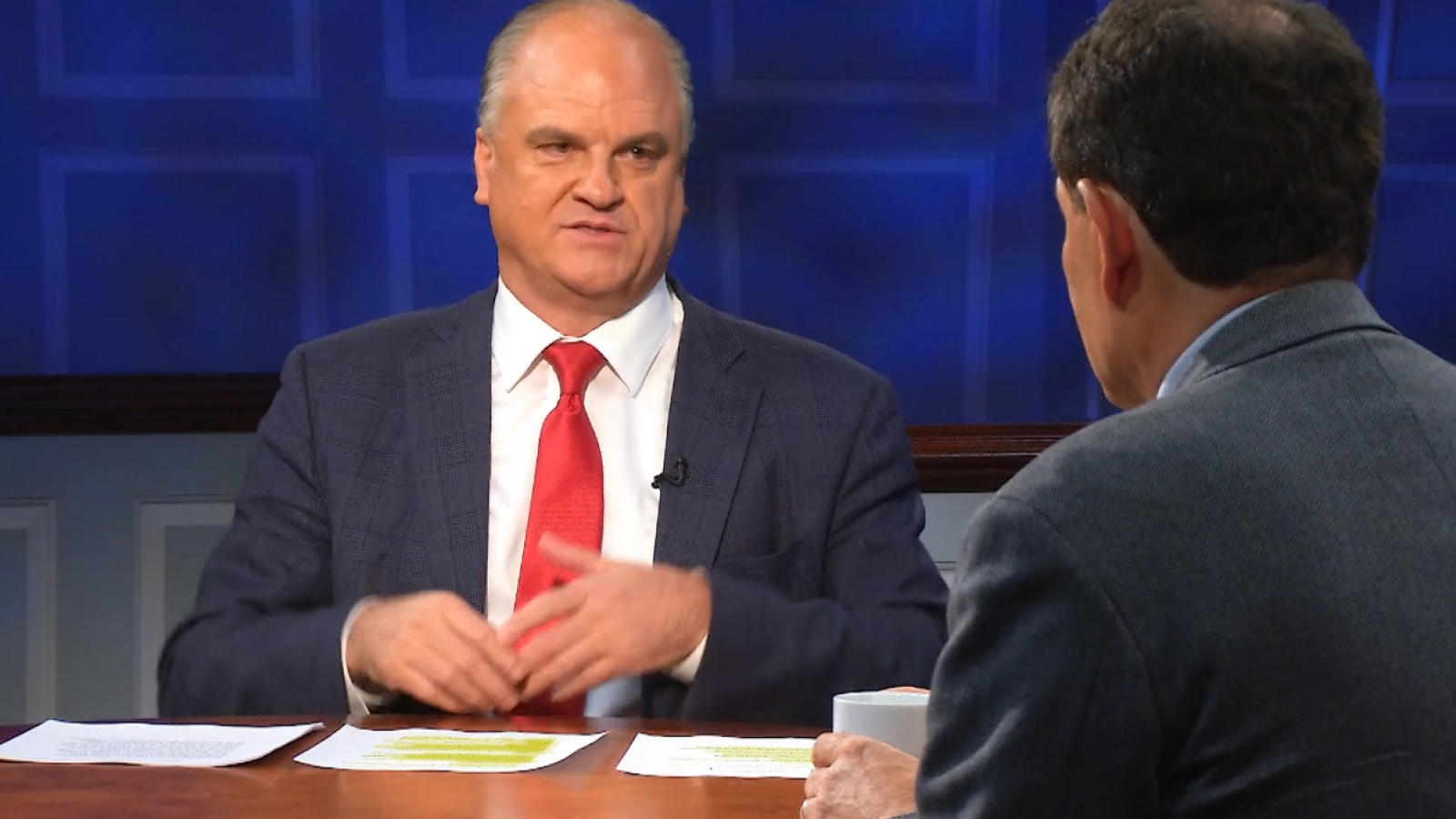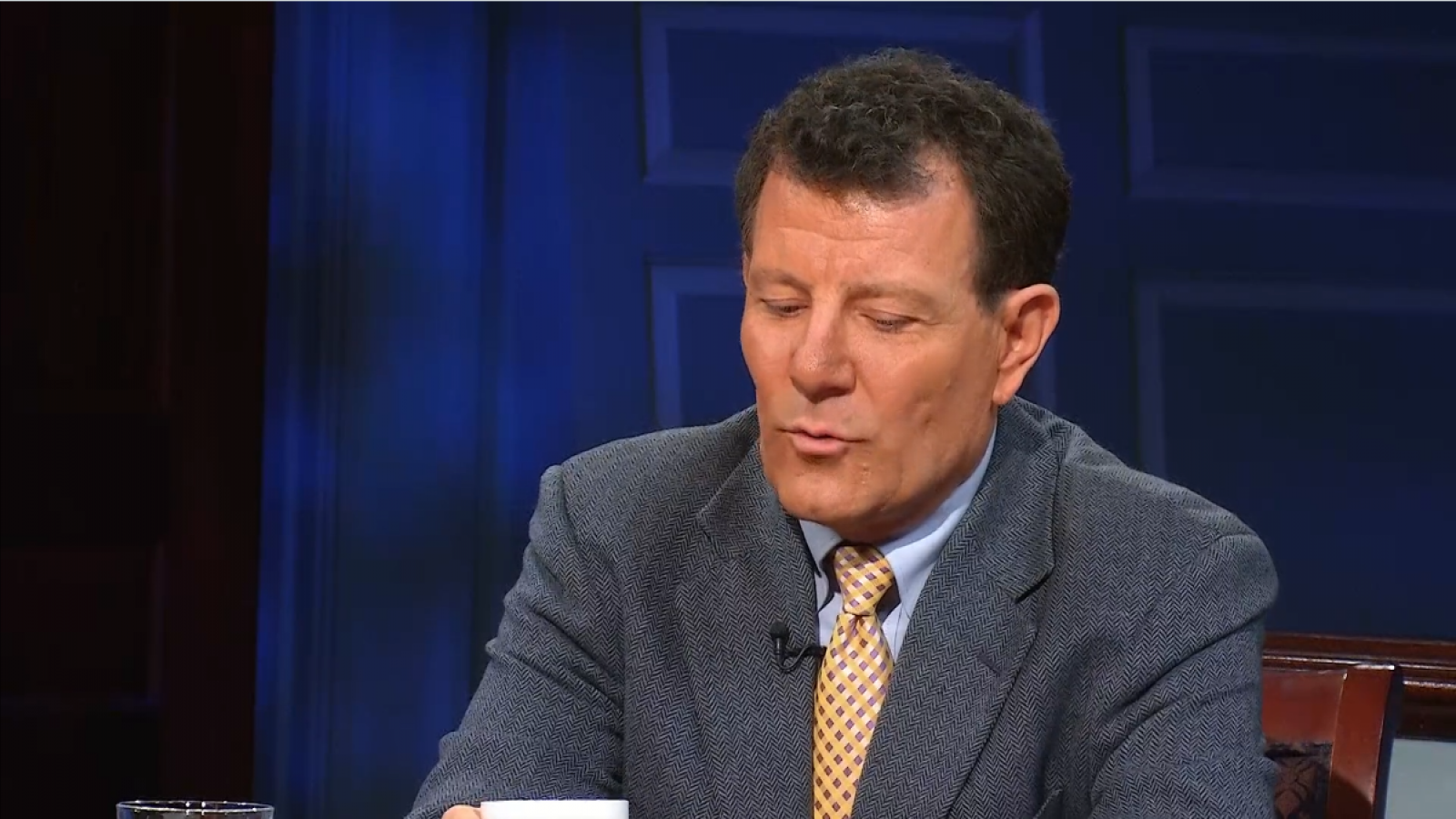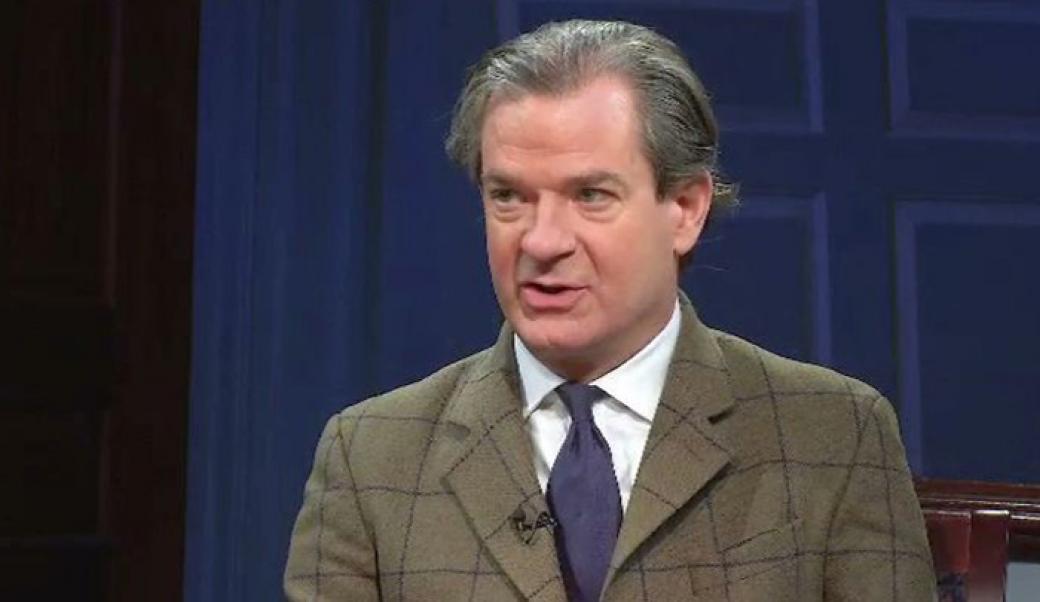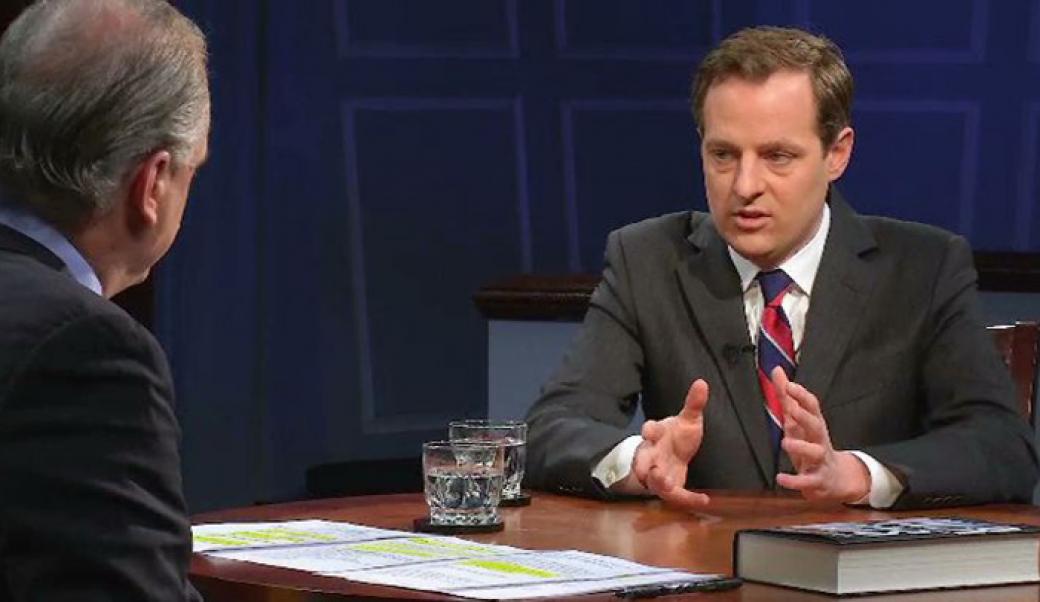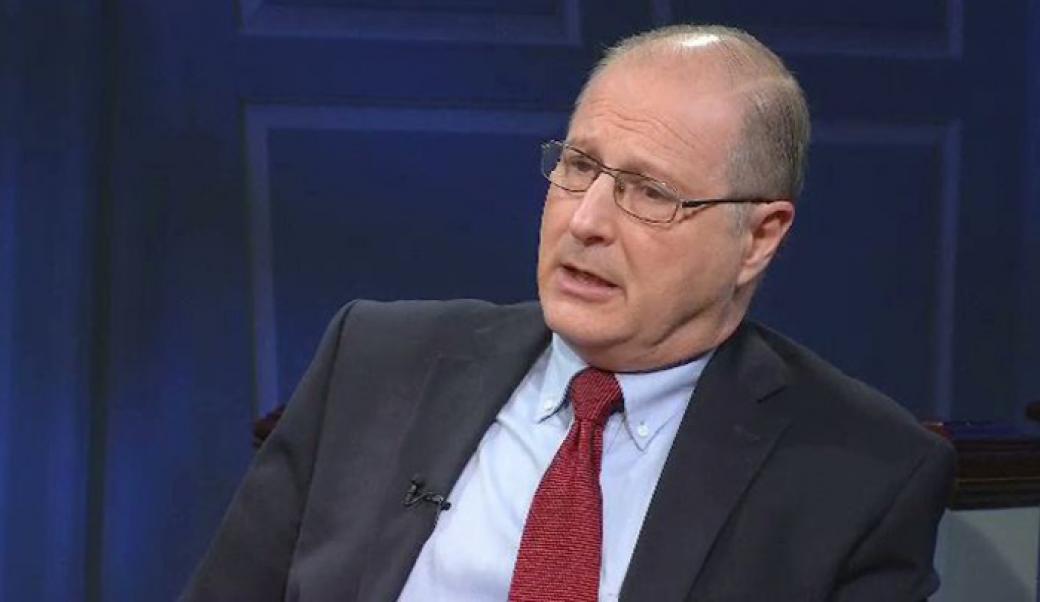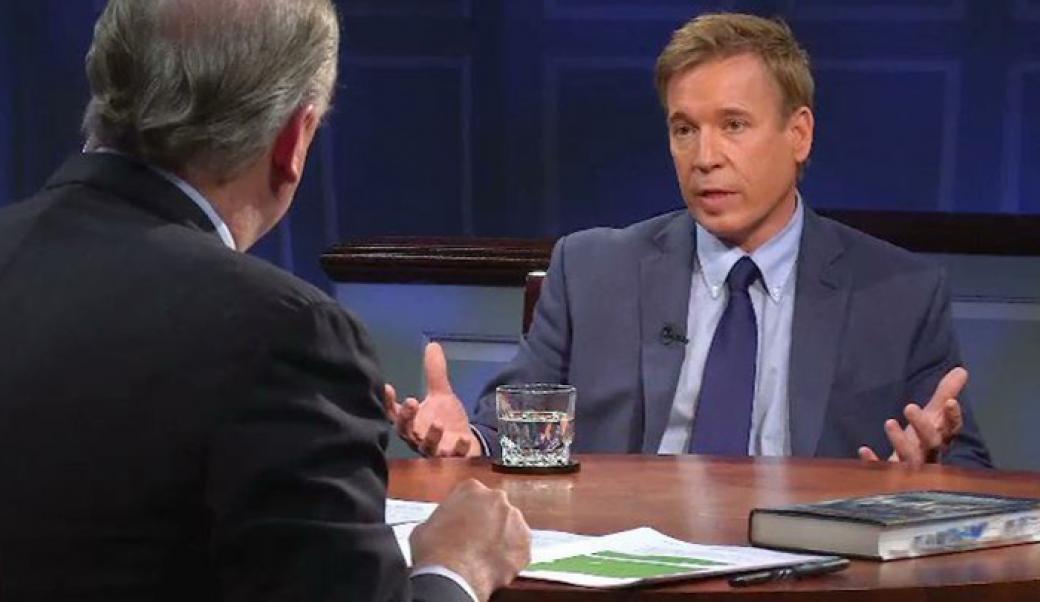About this episode
November 12, 2017
Nicholas Kristof
Hosted by Douglas Blackmon
These are perplexing times in American life. We may be closer to nuclear war than at any time since the Cuban Missile Crisis. Our relationships with historical allies are sharply strained. US political parties have internal divisions. We appear to be a society that is collectively confused about who we are. For insight on this week's episode, we’re joined by one of the great American voices of reason, NICHOLAS KRISTOF, a columnist for The New York Times and winner of two Pulitzer Prizes. Kristof's twice-weekly op-eds have long examined the most pressing issues facing the United States both domestically and abroad, including a seven-part series entitled “When Whites Just Don’t Get It” and, recently, an account of his five-day trip to North Korea called, “Inside North Korea, and Feeling the Drums of War."
War and Terrorism
What's really happening in North Korea?
Transcript
0:40 Douglas Blackmon: Welcome back to American Forum. I’m Doug Blackmon. These are perplexing times in American life, all across the political spectrum. Our nation is as deeply divided over the performance of the current president as at any time in living memory. We may be closer to nuclear war—this time with North Korea—than at any time since the Cuban Missile Crisis. Our relationships with historical allies are sharply strained. U.S. political parties have profound internal divisions. Our political discourse is coarse and even crude. Who would have ever imagined a social media tit for tat between the grieving, pregnant widow of an American serviceman killed in battle and the sitting president of the United States? And amid all that turmoil, attitudes and prejudices about gender and race that almost all Americans not long ago would have said were rightfully relegated to our past now seem very much emboldened and alive. We appear to be a society that is profoundly confused about who we are, collectively; what national principles still “bind us together” as former President George W. Bush recently said, and what future we wish to see for our children and grandchildren. To help us wrestle with this sour moment in our national history, we’re joined in this episode by one of the great voices of American reason, Nick Kristof, a columnist for The New York Times and winner of two Pulitzer Prizes: one in 1990 that he shared with his wife, Sheryl WuDunn, for their reporting on the Tiananmen Square student protests, and one in 2006 for his coverage of the Darfur genocide. The pair has also authored several books, including the number one bestseller, Half the Sky, about the global oppression of women. Nick’s twice-weekly op-ed column for the Times has long examined the most pressing issues facing the U.S., both domestically and abroad, including a seven-part series of columns entitled, “When Whites Just Don’t Get It” and, recently, an account of his five-day trip to North Korea entitled, “Inside North Korea, and Feeling the Drums of War". Thank you for being here.
Nicholas Kristof: Good to be with you again.
02:40 Blackmon: One of the remarkable dimensions of you as a writer and a—observer of American life and the world is that you write about everything, and it's really quite extraordinary that—
Kristof: It's a great gift to journalism, this, you know, chance to be interested in something and then go out and report it.
02:56 Blackmon: Yeah, the ultimate generalist, but also one who becomes a profound specialist, too. That's truly the great gift. But you just came back from North Korea, so let's talk about that for a minute. Fundamentally, let's just—what was your take? A, do the North Koreans—do the people in North Korea, based on your experiences—are they—do they realize the conversation, the dialogue that's going on back and forth between their leader and the President of the United States, and are they—and do they believe this idea that the United States is on the edge of potentially invading or attacking North Korea?
Kristof: My bottom line is that I don't think Americans appreciate as much as they should how much danger there is that we will be at war with North Korea and, you know, that this will not be a war like Iraq or Afghanistan or even like Vietnam. This could very well escalate to a nuclear exchange, and this would be just catastrophic on a scale we haven't seen since World War II. One Stanford study said on the very first day of this war, a million people would die. And I don't think that this is the most likely course, but I think there is a real chance of this, 20 percent, say, which is staggering.
FACTOID: Pentagon: Non-nuclear war would kill 20K per day in South Korea
And I think that even the alternatives really are also pretty grim, long, which—probably long-term deterrence of North Korea with the capacity to deliver nuclear ICBMs to the U.S. I also think we—look, this is a—the problem from hell. I mean, it's—there's no good way to manage the North Korean crisis. Presidents since the first George Bush have dealt with it and have not been able to resolve it. But I do think that President Trump has used rhetoric that has essentially magnified the problem. And it was striking to me in North Korea that nobody, for example, knew the name of Otto Warmbier, the University of Virginia student who died after having been detained there and fallen into a vegetative state, and that's because the government didn't particularly want them to know that.
FACTOID: Warmbier arrested in North Korea in 2016 for stealing a poster
Every North Korean knew all about President Trump's threat to totally destroy North Korea, and that's because Kim Jong-un wanted people to know that, because it fits into his narrative where he is the protector of the Korean people from these maniacal American imperialists.
05:41 Blackmon: The escalation is not completely unlike certain moments in time in the past between the U.S. and North Korea. It does seem—it has reached a kind of pitch that we haven't seen, at least not in the current era before, and that does seem to have something to do with President Trump. But it's also the case that in the buildup to the Iraq War, when President Bush was in office, America proved vulnerable to the bombastic language of a madman on the other side or what seemed like a madman on the other side, where at that time you had Saddam Hussein coming out and saying things like, "Well, if the U.S. attack us, we're going to destroy them in the mother of all battles" and etcetera, etcetera, suggesting that there were nuclear weapons when there were not. I mean, this whole litany of things that Americans took very seriously and then turned out all to be wrong. And it—for me, when we get into this current situation, it makes me worried that we were so vulnerable to it then, now we're—now we have someone who actually does have nuclear weapons. Does America—do we have the patience to deal with a—with as petulant and irrational a figure as this, or are we inevitably going to take the bait? Or what's [Kristof: Well—] the risk of that?
Kristof: I mean, that's—it's interesting that—I think one reason why we are dealing with Kim Jong-un today and his nuclear weapons program is precisely the Iraq War. I think that a combination of the Iraq War and the Libyan intervention essentially convinced Kim Jong-un that he needs nuclear weapons to make sure the same thing doesn't happen to him. And this—I—you know, I told my North Korean interlocutors at one point that I have this terrible sense of déjà vu, that it reminds me of going to Iraq in the runup to the Iraq War, to the American invasion, "and I don't think you know what you may be facing." And they said, "Oh, you completely misunderstand. The lesson of the Iraq War—if Saddam Hussein had just had the nuclear weapons that we now have, then he would still be in power."
FACTOID: Hussein captured December 2003, executed in Iraq three years later
And I think that that largely explains why they are so determined to have nuclear weapons and to have the capacity to blow up the U.S. Both sides are—I think are, at this point, intuitively inclined to respond to anything by escalating, and that does not work very well on a kindergarten playground and it works even less well when you have two leaders with nuclear power—with nuclear weapons.
08:12 Blackmon: And the lesson, of course, of Libya and Muammar Gaddafi would seem to be—at least for the North Koreans, the lessons would be that here you had a nation that had been involved in terrorism and all sorts of terrible things, but did have nuclear weapons and—weapons of mass destruction, and then agreed to give those things up so that it would be restored to the community of nations. And then, before too long, the United States abetted or certainly allowed to happen an insurrection and the ultimate execution of Gaddafi. No matter how bad a guy he was, that certainly doesn't suggest that entering into those kinds of arrangements with the U.S. is a reliable thing for a leader like Kim Jong-un.
Kristof: That's right. That's certainly the lesson that North Korea has absorbed, that the lesson of Iraq and of Libya is that you need nuclear weapons if the U.S. doesn't like you. And they've been watching, and they raised the U.S. efforts to perhaps walk away from the Iran nuclear deal. And the lesson there, too, was that even if you reach some kind of a deal with the U.S., then it may not last very long.
09:16 Blackmon: What is baffling to me now, and this maybe takes us into some other things about the U.S.—but for the longest time, we had this notion, certainly in the faceoff with the Eastern Bloc in the height of the Cold War, this notion that it was the spillover of Western culture and the recognition of the prosperity of the West making its way into the East that finally undermined the legitimacy and the ability of the Soviet Union and the Bloc to control those nations, and—but all of that was rooted in the idea that in the West, where we have this free exchange of ideas, we're relatively reliable comprehenders of the truth, that—you know, and in this atmosphere of openness, we actually get to the bottom of things and prosper from it, and on the other side of these fences, those people don't, and eventually they'll realize the value of our way. Well, now we look at this situation and you see that there's some change happening in North Korea. Some people are seeing some of these things, but certainly nowhere nearly enough to imagine—I don't think, tell me if I'm wrong—a destabilization of the situation there based on wanting to be more like South Korea. But at the same time, you look around America and you say we're not reliable narrators of our own story. We can't seem to judge what's true or not. The idea that we're the masters of that now seems completely a question.
Kristof: I mean, I must say that North Korea is really in its own alternate universe in terms of facts in a way that, you know, that we are not. And I do think they are vulnerable to that. I'm—you know, I hear that when North Koreans go abroad, one of the things that they ask about is, "So, how did the Korean War start, anyway?" And, you know, I was struck that—I kept asking North Korean officials who we met who would talk about the perfidy of the U.S. in starting the Korean War and then trying to invade the north and destroy—which, of course, is preposterous. You know, I said, "Well, so if the U.S. started the Korean War by invading to the north, then how is it that north managed to rush south and capture Seoul in three days?" And there were a lot of kind of deer in the headlight looks.
FACTOID: North Korea crossed 38th parallel June 25, 1950, took Seoul June 28
Their narrative doesn't really absorb that fact. So, I think that they are vulnerable on the history side. I think that they are vulnerable on the repression side. I think they're vulnerable on the economic performance side. And it's hard to see enough courage and anger to have a Tiananmen-style insurrection. But Kim Jong-un does not really have any obvious successor if something were to happen to him. And, you know, he's young, but he has been gaining a lot of weight, he is said to drink very, very heavily. And that, you know, that would be—if something did happen to him, that would be a moment when you could imagine a successor who is not in the Kim family and who takes the country in a somewhat different direction.
12:21 Blackmon: We're so convinced—and obviously, our system—comparisons against North Korea are just overly loaded. We're not very serious, it seems, about the most important issues that face us anymore, and seemingly unwilling to do the work it takes to get to the bottom of a lot of things. I mean, is that a fair characterization?
Kristof: Well, I think to some degree we've withdrawn from the world. I think that, ever since 9/11, we've had kind of unhappy experiences with the world, if you will, from Afghanistan to Iraq, and that there is a certain sentiment across much of the U.S. that, okay, we've done that, time to withdraw. And you see that—and I must say, to some extent, you see that in Europe, as well, with Brexit, with—you know, across much of Europe.
FACTOID: After 2016 “Brexit” vote, UK to leave European Union in 2019
I don't think that is a very viable strategy. I also think that American—at least in Europe, people, I think, have some sense of how their country is perceived. I think that in the U.S., we're much less likely to have a realistic view of how we are perceived and we get into trouble as a result. I always encourage young Americans to go spend some time abroad, and that's partly because I think it can be a transformative experience for them, but also, I think, we'd have better policy. I mean, I think that, you know, our invasion of Iraq was based on this astonishing idea that we were going to be welcomed with flowers. And certainly, nobody who had been in Iraq would have thought that. But even people who had lived for a year in Latin America, I think, would have been suspicious of the idea that we would be—that our army would be welcomed with flowers in a foreign country. And that lens of nationalism, that prism, is one that we don't really get. And often, as a result, I think we have pretty bad policy-making.
14:05 Blackmon: And all of that, though, gets at, to me, again—just something I can theorize about, but I really am not sure about—and that is that, for instance, you know, more Americans travel overseas today than—you know, by exponentially greater numbers than at any time in even recent American history.
FACTOID: 35 U.S. million citizens went abroad in 2016, a seven percent increase from 2015
It's astounding, you know, how many of us do that. We're so wealthy, by comparison, to the rest of the world. We have so much mobility within the United States. Regions don't matter much anymore. So many of us do go overseas. We're better educated than we've ever been, we—more people graduate from high school than at any time, across all ethnic groups and such. I mean, on the one hand, we have achieved a—what should be a level of sophistication and worldliness that was unimaginable not long ago. And yet, we are as confused as we are right now about these basic things of what do we really believe and what are the things that people say really mean?
Kristof: Well, I think one problem has to do with our own world of news organizations and the fragmentation that comes from the internet. Years ago, there was a media scholar, Nicholas Negroponte, who you may know, and he argued that with the internet, we would have the advent of a daily news product that he called "The Daily Me" and that has arrived. [Blackmon: Yeah, absolutely.] We all get "The Daily Me". And so, in other words, instead of getting—instead of watching Walter Cronkite and getting some kind of a reasonably neutral view of the world, whether we're on the left or the right, we tend to get some combination of news sources that confirm how brilliant our own analysis of the world is and how fraudulent the other side is. And I think that genuinely rips apart any kind of common ground. We don't have really a common set of facts. And one consequence is that our news world has increasingly focused on personal issues and conflicts, and we've tended to—and especially TV—provide less coverage of larger international concerns and issues. So, TV has largely stopped covering the world, except for bits and pieces that pertain to the U.S.
16:21 Blackmon: We're taping this at the University of Virginia, in Charlottesville, Virginia, the place that—a city whose name is more familiar to most Americans than it had been for a long time because of these terrible things that happened this past summer. What did all that mean to you?
FACTOID: Heather Heyer killed protesting ‘Unite the Right’ rally on August 12
Kristof: So, I mean, it didn't come out of thin air. Obviously, there have been similar conflicts arising and then some—to some degree, the 2016 election, I think, arose from an ethos that reflected that. I mean, one thing I always think about is that—how was it that in the 1960s, we managed to pass the Civil Rights Act of 1964 and the Voting Rights Act of 1965—that an awful lot of white people could be quite inclusive at that time, and yet that sense of inclusiveness seems to have frayed, whether toward African Americans, toward Latinos, toward Muslims. And I sometimes wonder if it isn't, in part, a reflection of economic hopes. And, you know, I think that in the mid-1960s, there were a lot of white Americans who saw that they were living better lives than their parents had lived. They foresaw their children living better lives. And in that context, they were willing to make a little space at the table. And I think that these days, there are a lot of white Americans who feel like they are slipping backward, and they are resentful and upset, and in that context, it becomes easier to point a finger than to offer a helping hand. One of the most startling figures to me of looking at the country that I think is related to that is that the cohort in the U.S. born in the 1940s—for them, at any point in their careers, 90 percent of them were earning more than their parent at that stage in their career. For those born in the 1980s, only half were. You know, so half of the people were earning less than their parents in real wages at that time. And I think, in that context, it becomes a lot easier to have a kind of meanness, a lack of empathy, a lack of compassion, and a tendency to blame others for problems. I think there's sometimes a misperception, and it may be that what happened in Charlottesville amplifies that, that our big problem today is old-fashioned racists who chant and who believe in segregation or believe in inequality of the races. And I really don't think that's the case, that clearly there are such people, but I think that the big problem we have in America is more complicated and more subtle. And I think it's this issue of unconscious bias, and it's well-meaning people who intellectually believe in racial equality and are horrified at discrimination, and yet act in ways that perpetuate that discrimination because of bias that is frankly very human to participate in. And, you know, I—whenever people study this, they find that, yeah, we have all—we're a bundle of biases. We have biases about race, about gender, about body shape, about age, and I do think that the only way to really address these is to talk about them.
20:01 Blackmon: Let me ask you about something else before we run out of time. The monument debate, the Confederate monument debate that was—in the end, whether the events in Charlottesville were really about the monuments is a—I think is an interesting question. But the monument debate, because of those events, suddenly took on a different character and a different form, nationalized it, in effect, in a way that had not been the case for the previous twenty-five years. But what's your basic position on that whole question?
Kristof: I think these monuments were, in many cases, established with a political and social purpose, with a didactic purpose, to teach a version of history that I am profoundly uncomfortable with, I think that our society is uncomfortable with. And so, I think that in most cases, they don't belong there. But I must say that as I look at the priorities to build a more equitable society, addressing the history issue and the monument issue seems to me to be a lower priority than the fact that 535,000 kids in the U.S. have lead poisoning in—and they're—kids of color are twice as likely to get that, that we have this educational system that perpetuates inequality, that we have a criminal justice system that systematically treats kids of color more harshly.
21:20 Blackmon: It's also, though, at the same time—and I—I mean, I have—I've taken some fairly strong positions about the monument debate, have said that it is important, at the same time I've—can make the argument that it's more—it's exactly the kind of more complicated and more subtle question that we can't seem to process anymore in American national discourse. So, for—in some respects, I wonder if the monument debate—what maybe is useful about it is just this thing that something as basic as what this piece of granite actually stands for, that maybe it makes that point.
Kristof: I think that on the drug issue, I think you're absolutely right, that it's, you know, appalling that when this was an African American disproportional issue, then this had to be dealt with firmly. People—you know, lock 'em up. And now that—we take a much more humane approach when it's whites who are suffering. I think the public health approach is infinitely more sane, [Blackmon: For everyone.] effective, as well as humane for everybody. I do think that that's correct. But I think also that there is a problem with us in the media and our lack of using a humanizing lens to write about some of these public policy issues, and that we are now doing that when whites are affected. We should have been doing that long ago when African Americans were affected, and we—I think we dropped the ball on that, and I think, you know, it underscores the role that the news media can play on the issues like this.
22:51 Blackmon: What would your message be to a 25-year-old who's very confused about what's happening in the country and said, "Well, what's the—what should I be doing, Mr. Kristof, to try to make the—this country work in a more sane way than it appears to be right now?"
Kristof: So, well, of course, I would encourage the person to read The New York Times every day. (laughter)
Blackmon: Particularly twice a week. (laughter) Two specific days a week, yes.
Kristof: You know, I—and so, I would encourage the person to really seek out news that may challenge him or her, and to get engaged with social issues, maybe as advocacy, maybe as volunteering, maybe as donating. But the worst advice that I hear given students is to spend the first third of your life studying, the middle third making money, and the final third giving back. And if you do that, you are robbing yourself of thirds of your life of meaning. And I would then encourage the student to—you know, I—to me, one of the grand issues and one of the ways in which we fail is in terms of providing opportunity for people. And I think—I wonder if liberals like myself don't sometimes overuse the word inequality, which tends to be a liberal word and I think sometimes scares off conservatives. I think opportunity is a word that maybe makes it easier to build alliances, to change policies, and I think that that is where we systematically fail so many—whether it's African Americans, Native Americans, you know, so many folks that we don't provide that opportunity early in life and that our policies don't. So, I would encourage that person to—you know, doesn't mean you have to go off and become a social worker in the tough side of the city. But if you become a doctor or a lawyer or an investment banker, then find some way, in your career, on the side to do things that give your life meaning as well to try to create opportunities for others who don't have the advantages that you do.
25:08 Blackmon: Yeah, that's great. Nick Kristof, thanks for joining us.
Kristof: My pleasure.
Blackmon: Has this or any other episode of American Forum raised any burning comments or questions for you? If so, reach out to me via the email shown on your screen or on Twitter, @douglasblackmon. If you'd like to follow our guest, his handle is @NickKristof. You can also visit us at MillerCenter.org to watch past episodes of American Forum or to read expert analysis of presidential history and foreign and domestic policy. See you next week.
